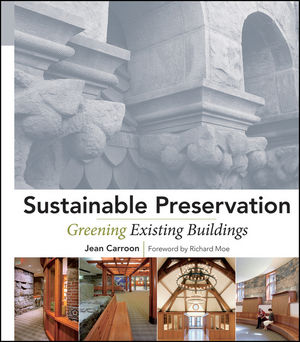Sustainable Preservation: Greening Existing BuildingsISBN: 978-0-470-16911-7
Hardcover
432 pages
November 2010
 |
||||||
FOREWORD xi
Richard Moe
ACKNOWLEDGMENTS xiii
PART 1: OVERVIEW 1
CHAPTER 1 BUILDINGS AND ENVIRONMENTAL STEWARDSHIP—UNDERSTANDING THE ISSUES 3
1.1 Climate Change and Buildings—the Imperative 3
1.2 Historically Green—What Makes Existing Buildings Green 7
1.3 Terminology of Evolving Green Design 12
1.4 Rethinking Assumptions—Holistic Design 17
1.5 There Is No Finish—Creating a Culture of Reuse, Repair, and Renewal 18
CASE STUDIES
People’s Food Co-op, Portland, OR 21
Harris Center for Conservation Education, Hancock, NH 25
Trinity Church in the City of Boston, Boston, MA 30
U. S. Naval Academy Historic Academic Group, Annapolis, MD 35
Forbes Park, Chelsea, MA 39
CHAPTER 2 BUILDINGS AND SUSTAINABLE DEVELOPMENT—UNDERSTANDING THE GOALS 43
2.1 Sustainable Development versus Sustainable Design 43
2.2 The Triple Bottom Line—People, Planet, and Profit 44
2.3 The Triple Bottom Line and Historic Preservation 47
2.4 Regional/Community Connectivity 53
2.5 Interwoven History of Sustainability and Historic Preservation 55
CASE STUDIES
CCI Center, Pittsburgh, PA 63
Center for Neighborhood Technology, Chicago, IL 66
Philadelphia Forensic Science Center, Philadelphia, PA 71
Brewers Hill (Natty Boh Building), Baltimore, MD 74
Denver Dry Building, Denver, CO 77
CHAPTER 3 TOOLS, GUIDELINES, AND PROCESS—BALANCING THE GOALS 83
3.1 Balancing Objective and Subjective Goals—Integrated Design 83
3.2 Green Tools and Metrics—Urban and Campus 88
3.3 Green Tools and Metrics—Building and Site 90
3.4 Historic Property Designation and Treatment Guidelines 95
3.5 Balancing Systems and Guidelines—Whole Building Design 98
CASE STUDIES
Whitaker Street Building, Savannah, GA 103
Alliance Center for Sustainable Colorado, Denver, CO 107
Thoreau Center for Sustainability, San Francisco, CA 111
Gerding Theater (Portland Center Stage), Portland, OR 115
Howard M. Metzenbaum U. S. Courthouse, Cleveland, OH 120
PART II: TARGETED RESOURCE CONSERVATION 125
CHAPTER 4 WATER AND SITE 127
4.1 Water—The Most Precious Commodity 127
4.2 Watersheds, Stormwater, and Site Design 130
4.3 Water and Energy Systems 137
4,4 Water and Mechanical Systems 138
4.5 Water and Sewage Systems 140
4.6 Closing the Circle—Reuse, Management, Education, Delight 141
CASE STUDIES
The Welcome and Admission Center at Roger H. Perry Hall, Champlain College, Burlington, VT 145
Chicago Center for Green Technology, Chicago, IL 149
Blackstone Station Office Renovation, Harvard University, Cambridge, MA 153
Immaculate Heart of Mary Motherhouse, Monroe, MI 157
Lazarus Building, Columbus, OH 160
CHAPTER 5 ENERGY—NOT THE ONLY, ISSUE BUT . . . 167
5.1 Energy Overview 167
5.2 Less Is More—Avoided Impacts 171
5.3 Reducing and Shifting Electrical Loads 175
5.4 The Building Enclosure 182
5.5 Avoiding Silos 188
CASE STUDIES
Cambridge City Hall Annex, Cambridge, MA 190
S.T. Dana Building, U. of Michigan, Ann Arbor, MI 195
Lion House, Bronx Zoo, Bronx, NY 199
Scowcroft Building, Ogden, UT 205
John W. McCormack Federal Building, Boston, MA 210
CHAPTER 6 INDOOR HEALTH—LIGHT, AIR, AND HEALTH 217
6.1 Indoor Air Pollution 217
6.2 Air Quality and Ventilation 220
6.3 Light and Connections to Nature 222
6.4 Healthy Spaces and Productivity 224
6.5 Renewal and Delight 229
CASE STUDIES
AIA Honolulu, Honolulu, HI 231
Boulder Associates Offi ce, Boulder, CO 233
NRDC Southern California Offi ce (Robert Redford Building), CA 236
Alberici Corporate Headquarters, Overland, MO 240
Montgomery Park Business Center, Baltimore, MD 244
CHAPTER 7 MATERIALS AND RESOURCES—REDUCE, REPAIR, REUSE, RECYCLE 251
7.1 Consumption and Waste—A Throwaway Culture 251
7.2 Diverting Waste—Reuse, Recycle, Downcycle 255
7.3 Identifying Better Products 257
7.4 Resource Optimization—Extending Service Life 260
7.5 Changing Priorities Ahead—Respecting both Past and Future 262
CASE STUDIES
Stop Waste, Oakland, CA 264
The Barn at Fallingwater, Mill Run, PA 268
Pittsburgh Glass Center, Pittsburgh, PA 272
North Dakota State University School of Visual Arts & Architecture, Fargo, ND 277
PART III: OF SPECIAL NOTE 283
CHAPTER 8 BEST PRACTICES—OPERATIONS, MAINTENANCE, AND CHANGE 285
8.1 Opportunities—Essential and Immediate 285
8.2 Implementation Tools 288
8.3 Housekeeping—Continual Improvement 291
8.4 O & M—the User Impact 295
8.5 Best Practice—Facilitating Change 297
CASE STUDIES
St. Stephen’s Episcopal K-8 School, Harrisburg, PA 301
Candler Library Renovation, Emory University, Atlanta, GA 305
Jean Vollum Natural Capital Center, Portland, OR 309
Eastern Village Cohousing Condominiums, Silver Spring, MD 314
Felician Sisters Convent and School, Coraopolis, PA 318
CHAPTER 9 HOUSES 323
9.1 Houses—The Impact of Our Choices 323
9.2 Energy Conservation, Envelope, and Alternative Energy 325
9.3 Holistic Water Conservation 328
9.4 Materials—Reduce, Reuse, Recycle, Repair, and Renew 333
9.5 Changing Behavior and Options—Living Sustainably 335
CASE STUDIES
Hanvey House, North Vancouver, BC 336
Solar Umbrella House, Venice, CA 339
Capitol Hill House, Seattle, WA 345
Adeline Street Urban Salvage Project, Berkeley, CA 348
Chicago Bungalows, Chicago, IL 352
CHAPTER 10 THE RECENT PAST 357
10.1 The Recent Past—Modern Architecture, Boomer Buildings 357
10.2 Preservation Challenges 360
10.3 Environmental Dilemmas 361
10.4 Strategies for Renewal 362
10.5 Lessons Learned 367
CASE STUDIES
Karges-Faulconbridge Offi ce Building, Roseville, MN 368
Crown Hall, Chicago, IL 371
North Boulder Recreation Center, Boulder, CO 375
California College of the Arts, San Francisco, CA 378
Vancouver Island Technology Park, Victoria, BC 381
INDEX 387



